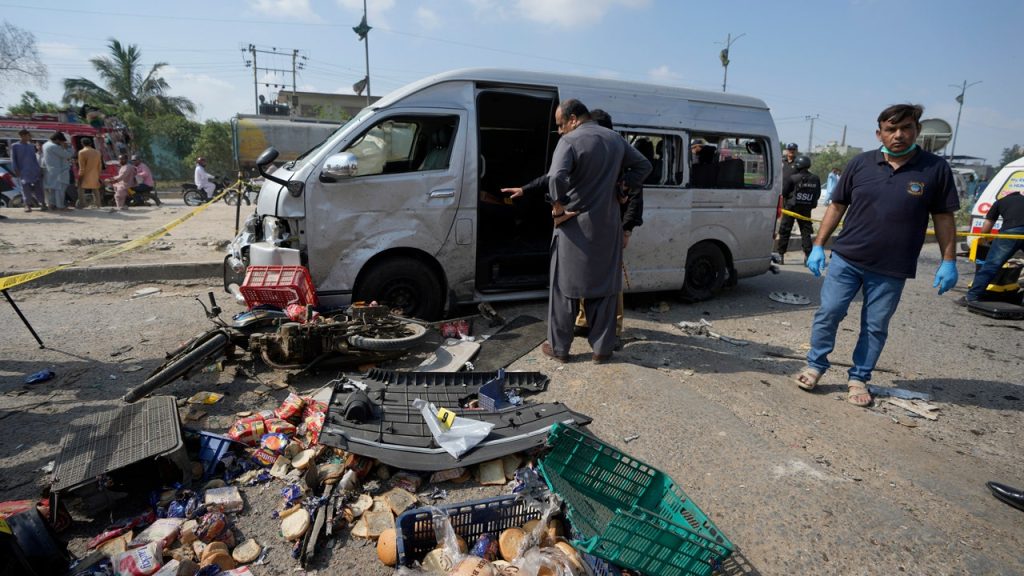A suicide bombing took place in Karachi, Pakistan, targeting a van carrying Japanese autoworkers. The Japanese nationals narrowly escaped the attack, but three bystanders were wounded. The police escorting the Japanese returned fire, killing an accomplice of the suicide bomber who remains were found on the scene. President Asif Ali Zardari and Prime Minister Shehbaz Sharif condemned the attack and praised the police for their quick response. The motive behind the attack is not yet known, but speculation points towards either a separatist group or the Pakistani Taliban.
The city of Karachi is a hub for various Chinese-funded projects in Pakistan, including the China-Pakistan Economic Corridor. Insurgents have targeted Chinese workers in the past, such as the March attack on five Chinese nationals and their Pakistani driver near the Dasu Dam. This suicide bombing on Japanese autoworkers, however, is the first of its kind. The attackers have not claimed responsibility for the incident, but the police suspect the involvement of a separatist group or the Pakistani Taliban due to their history of targeting security forces. The police were on high alert due to reports of possible attacks on foreigners working on Chinese-funded projects in Pakistan.
In a separate incident, an Afghan Taliban religious scholar, Mohammad Omar Jan Akhundzada, was killed in Quetta, Pakistan, by unknown gunmen. Akhundzada was a member of the Taliban oversight committee of Islamic scholars and taught at a jihadi seminary in Afghanistan’s Kandahar province. The Chief Afghan Taliban spokesperson, Zabihullah Mujahid, denounced the killing of Akhundzada, highlighting the significant role he played within the Taliban. It remains unclear why Akhundzada was still in Pakistan, as many Afghan leaders and scholars had returned to Afghanistan after the Taliban seized control of the country in August 2021.
The van carrying the Japanese autoworkers was heading to an industrial area where they worked at Pakistan Suzuki Motors. Despite the attack, all the Japanese nationals were safe, and the wounded bystanders were in stable condition at a nearby hospital. The incident highlights the ongoing security challenges faced by foreign workers in Pakistan, particularly those involved in Chinese-funded projects. The police were able to thwart the attack through a timely and quick response, demonstrating their commitment to safeguarding the lives of foreign nationals working in the country.
The attack in Karachi and the killing of Mohammad Omar Jan Akhundzada in Quetta underscore the persistent threat of terrorism in Pakistan. The government, including President Asif Ali Zardari and Prime Minister Shehbaz Sharif, have vowed to eliminate terrorism and ensure the safety of all citizens and foreign nationals in the country. Despite these efforts, the sporadic attacks on foreigners and religious scholars continue to pose a significant challenge to Pakistan’s security forces. The international community has also expressed concern over the escalating violence in the region, urging the authorities to take necessary actions to prevent further attacks and maintain peace and stability in the country.
The incidents in Karachi and Quetta have once again drawn attention to the volatile security situation in Pakistan and the continued presence of extremist elements in the country. The attacks on Japanese autoworkers and Afghan Taliban religious scholar Mohammad Omar Jan Akhundzada highlight the diverse range of targets that are vulnerable to terrorist violence in Pakistan. The authorities must remain vigilant and proactive in addressing the root causes of extremism and terrorism to prevent future attacks and safeguard the lives of all individuals living and working in Pakistan. The international cooperation and support in counterterrorism efforts are crucial in combating the evolving threats posed by extremist groups in the region.













